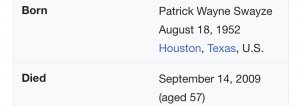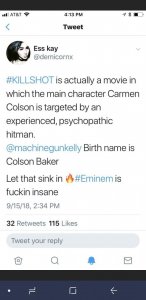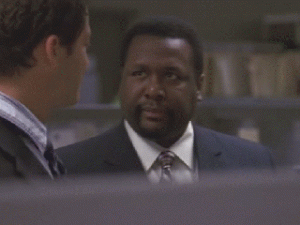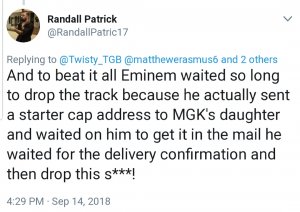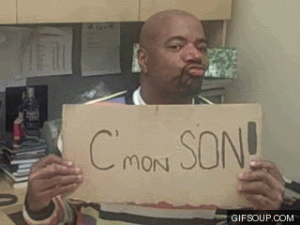Navigation
Install the app
How to install the app on iOS
Follow along with the video below to see how to install our site as a web app on your home screen.
Note: This feature may not be available in some browsers.
More options
You are using an out of date browser. It may not display this or other websites correctly.
You should upgrade or use an alternative browser.
You should upgrade or use an alternative browser.
- Nov 26, 2015
- 24,441
- 22,120
This the best Em in 10 years. Maybe 15 years..
- Oct 14, 2015
- 7,839
- 10,929
The Brand went in on the new Em album

- Jul 18, 2012
- 945
- 469
- Dec 25, 2003
- 43,262
- 28,579
Part of me knew, after how Slaughterhouse went down, that they'd come off neglected.Ummmmm, where's Griselda? Em signed them and forgot about them. This is why Shady is in shambles.
They're still putting out great music, but you'd think they'd want to associate it with Shady somehow. Dude's just dropping dope mixtapes, and no one thinks of Shady when they hear of them.
- Apr 16, 2005
- 16,118
- 16,875
Wood pipe his daughter 

Remy LeBeau
formerly carbon16
- Feb 15, 2011
- 10,835
- 9,964
Funny how the flows and things that em claimed other people copied are the same things joyner used in their record.
- Mar 3, 2012
- 23,082
- 8,730
More spins the last 3 days...
That venom song is def on the workout playlist
Also really feeling good guy
i don't listen to them on my weekly podcast rotation, but is there a certain time frame to listen to this
That venom song is def on the workout playlist
Also really feeling good guy
The Brand went in on the new Em album
i don't listen to them on my weekly podcast rotation, but is there a certain time frame to listen to this
- Aug 1, 2004
- 70,048
- 24,223

Eminem attends the rag & bone X Eminem London Pop-Up Opening on July 13, 2018 in London.
David M. Benett/Dave Benett/Getty Images for Rag & Bone
9/4/2018 by Charles Holmes
Kamikaze is a tantrum disguised as a course correction. More depressingly, it’s a 45-year-old multi-millionaire screaming into the void hoping someone, anyone is listening.
On Eminem’s surprise tenth studio album, a long-simmering frustration finally boils over. From a purely technical standpoint, it’s breathtaking to behold the renewed MC rapping with tightened flows over crisp production, weaving in and out of pockets with near the same dexterity as he did nearly two decades ago. Unfortunately, the fabled technician fails to cure the malignant disease that’s been eating away at his career for almost a decade.
Kamikaze’s meta-experiment marvels at its self-awareness, but never takes a moment to reckon with the criticisms that birthed it into existence. Eminem lays so much of the blame of his artistic decline at the feet of his various critics -- the media, rappers, time -- he fails to realize his tactics have turned him into hip-hop’s Trump, a man preaching the “Make Rap Great Again” ideals of a past that never really existed.
READ MORE
Eminem's 'Kamikaze' Set for No. 1 Debut on Billboard 200 Albums Chart
The narrative of Eminem’s tenth studio album is an antagonistic rebuke of the media and their response to Revival. The argument could be made that if Em’s last project received favorable reviews, there would be no need for Kamikaze’s reactive existence. On album opener, “The Ringer,” Mathers spends the bulk of his time complaining about how “a journalist/ can get a mouthful of flesh/ and yes, I mean eating a penis/ 'Cause they been pannin' my album to death.” In short, Eminem yells “fake news” for almost six-minutes at anyone who dares to critique him, almost like the President he’s aptly named “Agent Orange.”
What makes Eminem’s takedown of the press in 2018 so much worse is that he’s done it with far more nuance in the past. Seventeen years ago, during his scene-stealing turn on JAY-Z's “Renegade," lyrics like “we as a people decide if Shady's as bad as they say he is/ Or is he the latter, a gateway to escape?/ Media scapegoat who they can be mad at today” showed a level of self-awareness that he’s lost in 2018. Devoting an entire skit to one criticism from one review seems like a weird way for one of the best lyricists of his generation to spend his time.
At Eminem’s peak, he could lord his vision of “true hip-hop” -- lyrical precision, vivid storytelling, and blind loyalty to the genre’s past -- upon the masses. But as his dominance waned, so did the restrictive stylistic boundaries of the '90s and early 2000s that he cherished. The genre mutated past his singular vision and, throughout Kamikaze, he sounds like a man lost and bewildered in time. Marshall wags his hands like an old man griping at the kids from his metaphorical porch as he screams at and about Lil Yachty, lean, Lil Pump, AutoTune, Lil Xan, Drake, ghostwriters, and face tats.
READ MORE
Eminem's 'Kamikaze' On the Brink of Chart History in U.K.
The most telling part of Kamikaze is how Eminem deals with potential criticism from his peers like Tyler, the Creator and Joe Budden. In one of the album’s most offensive moments, Eminem falls back into his homophobic tendencies rapping, “Tyler create nothin', I see why you called yourself a f****t, *****.” Next, he takes his Shady Records signee to task, spitting, “Somebody tell Budden before I snap, he better fasten it / Or have his body bag get zipped / The closest thing he's had to hits is smackin' *****es.” Never mind the fact that the hypocritical Mathers alludes to a past of domestic violence and raps about busting “her jaw with a Louisville Slugger” on the cringe-inducing “Normal.” So why this much vitriol for Joe Budden?
On a December episode of Everyday Struggle, Budden encapsulated the problem with Revival -- in particular, the topical advance track "Untouchable," and the album's cover image, which featured the rapper looking ashamed behind an American flag. “This seems disingenuous,” Budden said. “It doesn’t seem sincere. It seems like a ploy and a ******* gimmick to sell records, which I don’t think that you need... It seems like you are taking the very common water-cooler conversation today of racism.”
Budden’s words make songs like “The Ringer” that much harder to swallow when Em laments he’s watching his “fanbase shrink to thirds” as a result of him criticizing Trump. When Eminem finally admits he wishes he could “reword” some of his rhymes about the president and “say I empathize with the people this evil serpent/ sold the dream to that he's deserted,” it sounds like a mogul upset that his “message” messed with the profit margins.
READ MORE
5 Things We Learned On First Listen to Eminem's New Album 'Kamikaze'
The insidiousness of the white male ego is that it disguises its fixation on unchecked ownership behind a veneer of nostalgia. Eminem was once a titan of hip-hop, but he never owned it. AutoTune, non-sequiturs, and freewheeling flows are now all big parts of the language of modern rap -- which doesn't need to adhere to Em’s myopic view of the genre.
Kamikaze soars when Em forgoes shaming the present and decides to reckon with his past. “Stepping Stone” sees him shedding the facades of Eminem and Slim Shady and instead come to terms with the sins of Marshall Mathers. When Em raps, “One minute you're bodyin' ****, but then your audience splits/ You can already sense the climate is startin' to shift / To these kids you no longer exist,” it’s a rare and needed moment of vulnerability. The world and rap might not need Eminem or Slim Shady anymore, but it could do with a little more Marshall.
https://www.billboard.com/articles/...m-kamikaze-joe-budden-tyler-the-creator-trump
- Mar 3, 2012
- 23,082
- 8,730
Make up your mind...you want the old Em where he is having a "tantrum screaming into the mic" or you want bars...
Fickle fans...
We know in this climate the thing that made eminem so big in the past isnt going to fly now...but is he still not coming with better bars then half the opposition?
Fickle fans...
We know in this climate the thing that made eminem so big in the past isnt going to fly now...but is he still not coming with better bars then half the opposition?
- Apr 16, 2005
- 16,118
- 16,875
Make up your mind...you want the old Em where he is having a "tantrum screaming into the mic" or you want bars...
Fickle fans...
We know in this climate the thing that made eminem so big in the past isnt going to fly now...but is he still not coming with better bars then half the opposition?
IMO it doesn't matter. the only person Em is getting compared to is old Em.
- Aug 1, 2004
- 70,048
- 24,223
Make up your mind...you want the old Em where he is having a "tantrum screaming into the mic" or you want bars...
Fickle fans...
We know in this climate the thing that made eminem so big in the past isnt going to fly now...but is he still not coming with better bars then half the opposition?
my favorite eminem is da rawkus records incarnation...
- Oct 14, 2015
- 7,839
- 10,929
i don't listen to them on my weekly podcast rotation, but is there a certain time frame to listen to this
They ridicule the album in the very beginning.
D
Deleted member 37467
Guest
We at the black delegation have had em since Renegade....we initially gave you darius rucker for him. 1 for 1 music icons.

- Jul 17, 2017
- 1,239
- 583
Jesus H Christ the world is dumb ... I mean I knew it was, but when your job is music critic and you bash an album, at least have awareness of the artist and his approach / intent ...
To bring up the second skit and act like it was intended to berate that particular review is about as asinine as it gets ... To ignore the historical relevance of the Paul skits is absurd ... It shows a lack of care for one's profession and feeds the exact narrative Em is pushing ...
That skit is an ode to crazy Em with the classic - Paul saying the album sucks and Em lashing out - dynamic that made Em's career ... The point was he was saying I'm not gonna respond to each personal attack while describing a scene where he was going to track down even the most insignificant of critics and do damage ...
To bring up the second skit and act like it was intended to berate that particular review is about as asinine as it gets ... To ignore the historical relevance of the Paul skits is absurd ... It shows a lack of care for one's profession and feeds the exact narrative Em is pushing ...
That skit is an ode to crazy Em with the classic - Paul saying the album sucks and Em lashing out - dynamic that made Em's career ... The point was he was saying I'm not gonna respond to each personal attack while describing a scene where he was going to track down even the most insignificant of critics and do damage ...
- Jul 19, 2012
- 23,066
- 33,938
Yes, his songs are lacking these days, yes his bars can be corny, but there isn't any rapper out that can piece syllables together the way em can.
First verse on Medicine Ball
- Dec 14, 2004
- 60,034
- 50,948
First verse on Medicine BallI love that rhyme scheme.
Stay Wide Awake has one of the craziest flows I've ever heard.
Music Box is ****in crazy too.
- Nov 18, 2007
- 28,132
- 9,289
Facts always will win over clever lines when it comes to diss records.
Why is Ether almost universally considered a better diss track than the Takeover then?
- Mar 3, 2012
- 23,082
- 8,730
No one cares about the truth when the lie is more entertaining......
You tae bo ho
You tae bo ho
- Jul 19, 2012
- 23,066
- 33,938
Stay Wide Awake has one of the craziest flows I've ever heard.
Music Box is ****in crazy too.
Stay Wide Awake my favorite joint on there. My girl can't stand it cuz I rap along
 I did not like that album when it first came out.
I did not like that album when it first came out.- Dec 25, 2003
- 43,262
- 28,579
I still **** with Relapse. Hello is something I still go back to regularly. I thought that was a decent album at the time, but I probably enjoy it more now.
Nostalgia is like 25% of that.
Nostalgia is like 25% of that.

- May 6, 2015
- 8,100
- 4,876
As much as I disliked the accent at first, Relapse grew on me and has some gems on it I can still play to this day.
Stay wide awake
Hello
Beautiful
Deja Vu
Stay wide awake
Hello
Beautiful
Deja Vu
Every CD critics gave it a three, then three
Years later, they'd go back and re-rate it
And call the Slim Shady LP the greatest
The Marshall Mathers was a classic
The Eminem Show was fantastic
But Encore just didn't have the caliber to match it
I guess enough time just ain't passed, yet
A couple more years, that ****'ll be ill-matic
- Jun 1, 2011
- 107,132
- 79,638
- Jan 2, 2010
- 83,324
- 119,490
Still think this is his best song since he came back. Ain't know he was going through it this bad and this Dre beat is fire.
Similar threads
- Replies
- 1
- Views
- 408
- Replies
- 123
- Views
- 5K
- Replies
- 0
- Views
- 400





